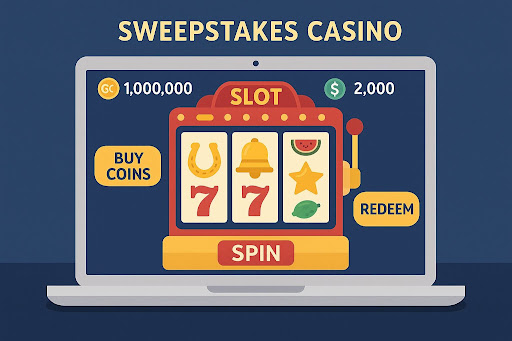Online sweepstakes casinos have surged in popularity across the U.S., providing slot-style and table-style gameplay while operating outside the scope of traditional gambling licenses.
They now stand alongside an established casino industry that has once again achieved record-breaking revenue.
This article takes a balanced look at how the two models differ, why sweepstakes sites are gaining traction, and which sweepstakes brands currently stand out in the U.S. market-with links for deeper reading along the way.

A sweepstakes casino is an online gaming platform that uses two kinds of virtual currency.
The first-usually called Gold Coins-is purely for entertainment and carries no cash value. The second-known as Sweeps Coins-serves as entries into a sweepstakes that can be exchanged for cash prizes if you win ([sweepstake casino interlink]).
Importantly, no purchase is required. Operators must provide free ways to collect Sweeps Coins-like daily bonuses or mail-in entries-which helps them comply with sweepstakes and promotional laws rather than gambling statutes.
These platforms emphasize that they do not offer real-money gambling but operate promotional sweepstakes without mandatory deposits. They also specify which states are excluded. For example, Global Poker allows U.S. players except those in Idaho, Michigan, Montana, and Washington (and in Canada, except Quebec).

Traditional casinos-both commercial and tribal-operate under strict state gaming commissions and tribal compacts. They feature slots, poker, blackjack, roulette, and sports betting, all supported by detailed licensing and responsible gaming standards. Many also include hotels, restaurants, and entertainment venues, forming key parts of tourism and local economies.
According to the American Gaming Association (AGA), U.S. commercial gaming revenue reached roughly $72 billion in 2024-its fourth straight record year. The sector supports hundreds of thousands of jobs and generates billions in tax revenue. Licensed casinos use certified systems, publish payout rates, and offer self-exclusion tools, promoting fairness and safety. In short, traditional casinos provide a regulated, transparent form of gambling that remains deeply tied to local economies.
| Dimension | Traditional Casinos | Sweepstakes Casinos |
| Legal framework | Operate under state-regulated gambling laws; require licensing, audits, and responsible gaming programs. | Function under sweepstakes and consumer-promotion laws; not licensed as gambling but must comply with “no-purchase-necessary” and disclosure requirements. |
| Currency | Real money in and out; wagers settled in cash or account credits. | Dual system: Gold Coins (for entertainment) and Sweeps Coins (free sweepstakes entries redeemable for cash). |
| Purchase requirement | Cash buy-in required to gamble. | No purchase necessary-free entry options are mandatory; paid purchases buy Gold Coins and may include bonus Sweeps Coins. |
| Redemption | Winnings can be withdrawn in cash, subject to verification and taxes. | Only Sweeps Coin wins can be redeemed; Gold Coins have no redemption value. |
| Eligibility / age | Typically 21+; available only in legal jurisdictions with ID verification. | Often 18+; offered in more states but still subject to exclusions per site. |
| Games | Slots, poker, table games, sportsbooks, and on-site entertainment. | Slot-style and table-style games online; some also feature poker or social play. |
| Oversight & enforcement | State regulators monitor payout fairness, security, and advertising; high tax compliance. | Governed by sweepstakes and consumer-protection laws; growing state scrutiny of “real-money-like” promotions. |
| Business model | Earn revenue from wagers and resort operations. | Profit from Gold Coin sales; Sweeps Coins serve as promotional bonuses. |
(For more on these differences, see operator FAQs and legal explainers. For market data, consult AGA sources. For the growing policy debate, explore current commentary on sweepstakes regulation.)

Rankings differ by publication and update frequently, but here’s a neutral look at well-known brands commonly appearing in reputable directories as of October 2025. Always verify state eligibility, age limits, and redemption policies before participating.

Although sweepstakes operators emphasize their adherence to promotion laws-no purchase necessary, alternative free entries, and transparent terms-state perspectives differ. Some attorneys general and legal analysts have urged tighter enforcement against what they see as unlicensed online gambling. As a result, availability could evolve on a state-by-state basis.
Meanwhile, traditional casinos-spanning physical properties, legal online platforms, and sportsbooks-continue to grow and set new revenue records, reinforcing the stability of licensed gambling frameworks.
Sweepstakes-style gaming isn’t a purely American trend. Worldwide, nations are crafting distinct regulatory approaches that reflect local laws, economics, and cultural values.
In Switzerland, online casinos are strictly regulated, with strong licensing and oversight ensuring transparency and responsible gaming.
In Brazil, policymakers are building a comprehensive legal framework for online gambling-part of a wider Latin American movement to blend innovation with consumer safeguards.
Mexico is also expanding its regulated online gaming market, introducing oversight systems to maintain fairness.
These examples illustrate how global markets are evolving to balance modernization, regulation, and player protection. The U.S. sweepstakes model-built on promotional, non-cash play-stands as one of many experiments shaping the future of digital entertainment worldwide.
Whatever your choice, always check eligibility, state restrictions, identity requirements, redemption procedures, and responsible gaming options before you play.